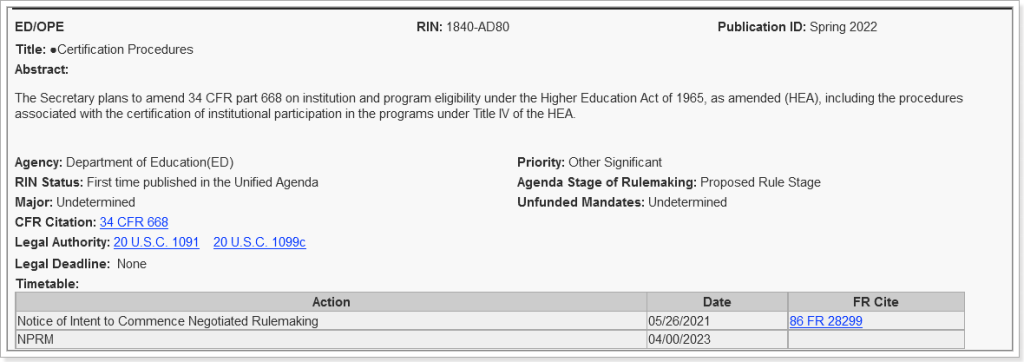What’s Happened to Those Federal Regs on Professional Licensure and Reciprocity?
Published by: WCET | 6/24/2022
Tags: Negotiated Rulemaking, Professional Licensure, Reciprocity, Regulation, SAN, State Authorization, U.S. Department Of Education
Published by: WCET | 6/24/2022
Tags: Negotiated Rulemaking, Professional Licensure, Reciprocity, Regulation, SAN, State Authorization, U.S. Department Of Education
Publication of the Department of Education’s proposed professional licensure and reciprocity rules will be delayed until 2023.
In March we alerted you to two proposed changes to U.S. Department of Education regulations from its Negotiated Rulemaking process earlier this year. These proposals would have a great impact on the digital / distance learning world, if implemented. The proposed changes were:
Unlike cable news networks “breaking news,” this is actually big news that we learned on Wednesday of this week. The above rules were part of proposed updates to the “Certification Procedures.” These are rules contained in the Program Participation Agreement that institutions must sign to be eligible to disburse federal financial aid.
On Wednesday, the Office of Management and Budget website posted updates on the status of the proposed regulations.
On the bottom line you can see that the NPRM (Notice for Proposed Rulemaking, where the Department seeks public comment) is scheduled for April of 2023.

In her post last week, Cheryl Dowd said that there were so many rules in the queue that is was hard to imagine they would get to all of them this year. She was prescient.
What this means is that they will not release the proposed rules for public comment until next Spring. If they publish the final rule by November 1, 2023, the regulations will go into effect on July 1, 2024.
We will continue to follow these rules and update you.


Lots.
We have been working on the behalf of WCET and State Authorization Network members …often behind the scenes.
During the negotiated rulemaking sessions, we were working with two of the negotiators representing consumer protection groups. We sought to create a compromise that would work for all. Cheryl Dowd (Senior Director, State Authorization Network and WCET Policy Innovations) and I advocated for the following principles in this compromise:

Cheryl Dowd, has contacted many associations of state licensing agencies for different professions. She has also talked to individuals at some specific state agencies. Many of them were unaware of the proposed rules or the possible impact that it could have on their agencies.
Cheryl’s persistence helped several organizations within a health profession to coordinate with each other. Eventually, they gained a meeting with Education Department leadership.
Several of the higher education presidential and leadership organizations are assembling a series of recommendations to the Department regarding the proposed rules. We contributed extensively to the wording in that letter regarding the anticipated professional licensure language.
Cheryl just returned from a meeting of the Council of State Governments and the National Council of State Legislators regarding licensure compacts that provide portability of a license to other compact member states for individuals who already possess a license from a state agency. She continually raised the issue about the need for increased communication between state licensing boards and postsecondary institutions to address portability of the education at the pre-licensure stage. We are already strategizing next steps about who else needs to be engaged.
We have presented on these issues several times, including at NASASPS – the state regulator organization. We also have talked to several other organizations. Next week, Kathryn Kerensky, Director Digital Learning Policy & Compliance and Cheryl are presenting at the National Association of Student Financial Aid Administrators (NASFAA) and then we are presenting at the Online Teaching Conference for the California Community Colleges and we will certainly raise this issue.
If you are getting the idea that Cheryl has been a bulldog on this issue, you are reading that correctly.
NC-SARA and the four regional higher education compacts (MHEC, NEBHE, SREB, & WICHE) have led the charge on this issue. Especially for WICHE and the compacts, we have provided input and advice.
During the negotiated rulemaking sessions, we provided background information and suggestions to several of the institutional negotiators. None of them had any background on this issue.
We were asked to contribute to the higher education presidential and leadership organizations’ recommendations to the Department. Again, we provided extensive suggested language for that letter regarding the anticipated reciprocity language.
We have presented on these issues several times and have talked to several organizations.
Our take has been that the proposed regulation would improve consumer protection in a few states, but will make SARA a less valuable option for several states and institutions. If states drop out, consumer protection could actually lessen. We are also sure that underfunded and low-in-personnel state agencies will be ill-prepared to handle the resulting onslaught of requests from hundreds (thousands?) of institutions.
We also wonder how the Department might enforce this rule if it were to go into effect. Let’s say that a reciprocity agreement does not comply. Will they deny aid to the students from institutions in the 40+ states participating in the agreement? We are unclear how this rule could be enforced. Due to the limitations on what the Department can regulate, it is focused on institutions but the intent seems to actually be to regulate states.
NC-SARA will soon update its policy process. And they need improved policies. Our recommendation is for the Department to work with states, the compacts, and NC-SARA to improve consumer protections through reciprocity. By doing that, protections will reach nearly every corner of the country. And that’s a better option than improving protections in just a few states.
The Department now has ample time to work with states on both these issues.
And we’re happy to help.

Our Message to Members
We’re doing lots of work behind the scenes. It’s not flashy. It’s not in the press.
We’re working to improve consumer protections for students.
And we’re working for you…our members.